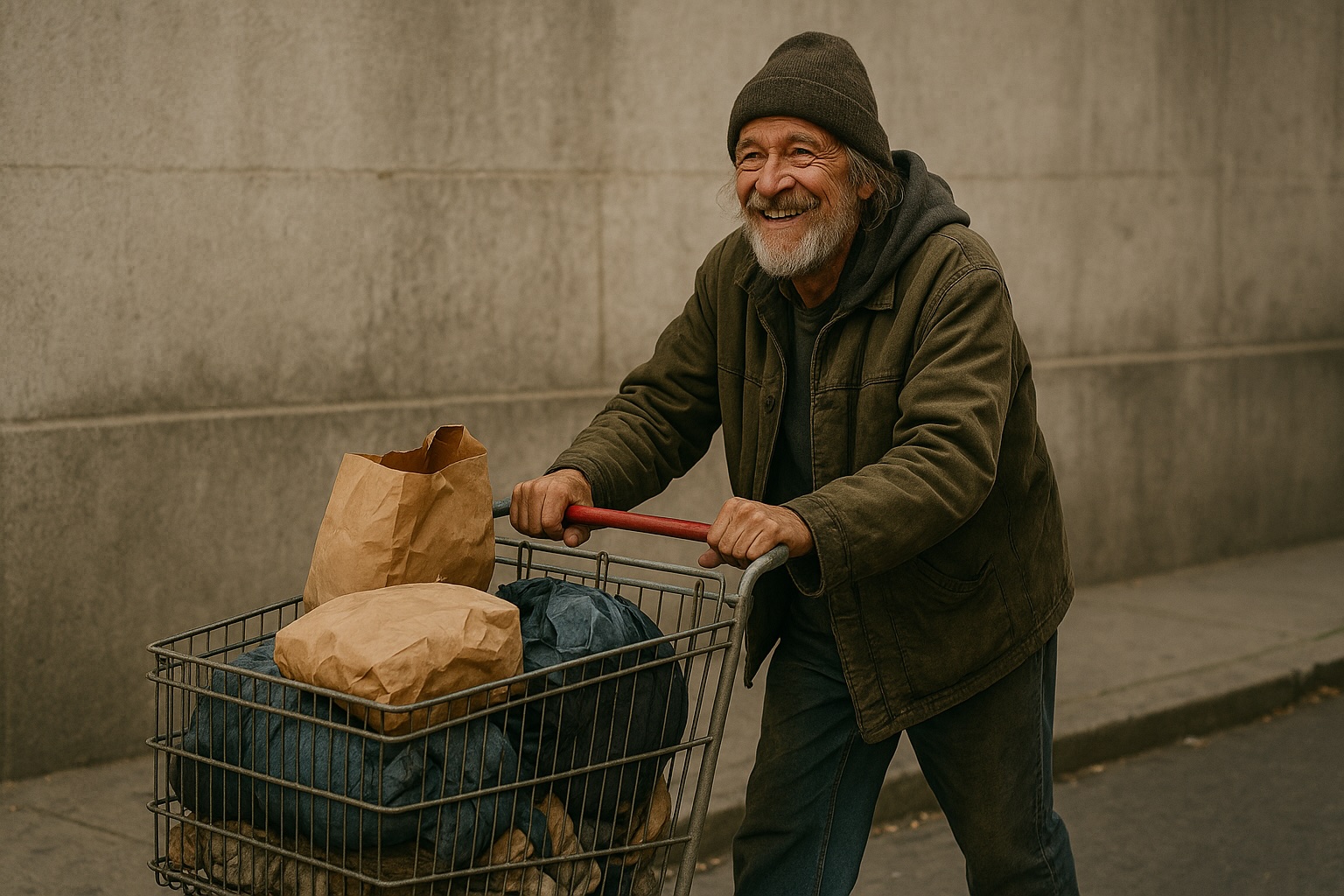The grocery cart announced Jed’s arrival long before he came into view. The front-left wheel squealed with each rotation, a metallic protest that had become his signature sound in Legalville.
Jed didn’t notice the town’s pitiful glances. After fifteen years of collecting cans and bottles, he had perfected the art of being simultaneously visible and invisible. Visible enough that people would set aside their recyclables for him. Invisible enough that they wouldn’t feel obligated to engage.
His cardboard refrigerator box stood in the narrow alley between First National Bank and Trust and Renaldo’s Bar and Grill—another of life’s ironies that was lost on no one but Jed himself. Each night, he would carefully maneuver through the flap he’d cut as a door, settle onto his frayed sleeping bag, and count the day’s earnings. On good days, it might be enough for a can of generic dog food. On exceptional days, he might splurge on a dented can of beans from the discount shelf. This had been Jed’s life for so long that he couldn’t remember anything else. Legalville’s boundaries were the boundaries of his world, and the daily rhythm of collection and survival was the only song he knew.
Until Tuesday.
The man in the charcoal suit looked comically out of place standing before Jed’s cardboard home, his polished shoes reflecting the afternoon sun. He held a leather briefcase in one hand and a document in the other.
“Mr. Jedidiah Lawrence?” the man asked, squinting at the paper.
Jed froze, his cart half-filled with the morning’s findings. Nobody had called him by his full name in years. Most folks in town didn’t even know he had a last name.
“That’s me,” he answered cautiously.
“My name is Thomas Blackwell, attorney-at-law.” The man extended his hand, then awkwardly retracted it when Jed didn’t reciprocate. “I have some news that I believe will be of great interest to you.”
Fifteen minutes later, Jed sat on an overturned milk crate, staring at the document in his dirty hands. The words blurred before his eyes, but the number remained crystal clear: $2,000,000.
“Your uncle, Gerald Lawrence, passed away last month. Having no children of his own, he left his considerable estate to your father. Since your father passed away last year, you are the sole heir.”
“Two million dollars,” Jed whispered.
“Indeed,” Thomas nodded. “The funds have already been transferred to an account in your name. This card,” he produced a shiny black rectangle, “gives you immediate access to your inheritance.”
The next few hours passed in a blur. Someone from the local newspaper got wind of the story, and suddenly Jed’s alley was filled with cameras and microphones. People who had walked past him for years were now hanging on his every word.
“What will you do with the money, Jed?” a reporter shouted over the crowd.
“Are you going to move out of Legalville?” asked another.
Jed looked at the eager faces surrounding him, then at his cardboard home. A slow grin spread across his face, revealing the three remaining teeth he possessed.
“I’ve got it all planned out,” he announced.
The crowd leaned in.
“First thing, I’m gonna buy some new cardboard. The good kind, thick and sturdy. Gonna rebuild this place proper-like.”
Confused murmurs rippled through the crowd.
“Then,” Jed continued, warming to his subject, “no more generic dog food. I’m upgrading to the name brands! And Spam! Do you know how long it’s been since I had fried Spam for breakfast?”
A reporter stepped forward, microphone extended. “Jed, you understand you have two million dollars, right? You could buy a mansion. Travel the world. Never work another day in your life.”
Jed nodded enthusiastically. “That’s why I’m not stopping there. I’m getting plastic plates instead of paper ones! And the grocery store manager will sell me one of those big carts if I offer enough. Think of all the cans I could collect with a cart twice this size!”
The crowd fell silent.
“He doesn’t get it,” a woman whispered to her companion. “He just doesn’t get it.”
Jed’s story sounds absurd, doesn’t it? And yet many of us do exactly that.”
We have been given an inheritance beyond calculation. We are not distant relatives of royalty—we are children of the King himself. We have been transferred from one kingdom to another, from darkness to light. But how many of us are still pushing squeaky spiritual grocery carts through life? How many of us are settling for slightly better versions of our old existence rather than embracing the completely new life we’ve been given? The inheritance is already yours. The declaration has been made. But like Jed, many of us can’t look beyond our slum life into our new reality.
Your inheritance in Christ isn’t something you have to earn or deserve. It’s already yours—not because of anything you’ve done, but because of everything He has done.
The Father has qualified you to share in the inheritance of the saints in the kingdom of light. He has rescued you from the dominion of darkness and brought you into the kingdom of His Son.
Today, you can choose to step out of your spiritual cardboard box. You can leave behind the dog food of the world. You can embrace your true identity and the unfathomable riches that are already yours in Christ.
Not because you’ve earned it.
Not because you deserve it.
But because you are loved.
And that makes all the difference.
“Giving thanks to the Father, who has qualified you to share in the inheritance of the saints in the kingdom of light. For he has rescued us from the dominion of darkness and brought us into the kingdom of the Son he loves.” Colossians 1:12-13




Thank you for sharing your gift of writing and challenging us to think!! Inspiring us to all share our gifts especially the gift of salvation!
Thanks so much, Tonya! You are a blessings! Blessings to you & Family!!